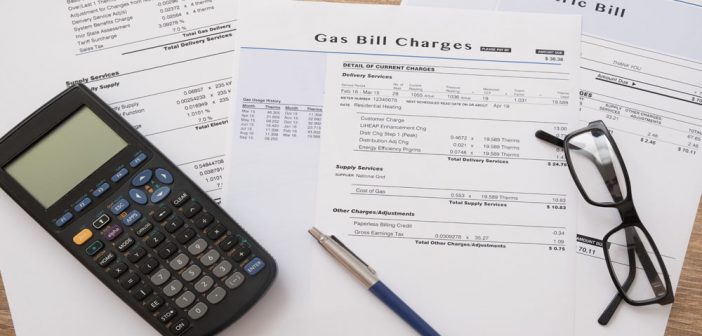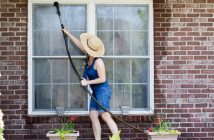Instead of dialing back the thermostat to save electricity and gas, you can put these simple tips to use to reduce your power and gas bill without sacrificing your comfort. Besides cutting your monthly energy bills, you’ll prolong the life of your appliances and enjoy a more comfortable home.
HVAC System
Your heating and cooling system uses the most energy of any other appliance of your home. While providing necessary comfort whenever you need it, it requires routine service and maintenance to run efficiently.
Check the air filter monthly and change when it’s dirty
Nothing drives up heating and cooling costs faster than a dirty filter. When the dust accumulates on the filter, the amount of air that can pass through slows. It takes longer for your HVAC system to heat or cool your home, driving up energy consumption. Clogged filters also increase the wear and tear on the equipment, leading to costly repairs.
Have the equipment serviced annually
HVAC systems create vibrations as they run, which loosens the parts. Some components require regular lubrication to operate smoothly. Over time, things get dirty and corrode, slowing down the electrical flow through them. When electricity slows, it creates heat and dirt, making it less efficient and it is also a fire hazard.
When an HVAC pro services the equipment, he/she cleans and adjusts all the parts, checks refrigerant levels and lubricates the motors. HVAC technicians bring the equipment back to its factory specifications, which lowers electrical and gas consumption.
Inspect the registers periodically
Watch for dust deposits on the registers themselves or nearby, this could indicate ductwork leaks. When the ducts have tears or breaches, some of the conditioned air leaves the ducts before it reaches the rooms. Rooms that the compromised ducts feed will be less comfortable than others.
Leaking ducts also degrade the indoor air quality by picking up dust from the areas they pass through. They may even pull carbon monoxide into homes that have vented gas appliances.
Avoid blocking or closing the registers to save money
Closing off rooms to cut conditioning bills could cost you more by stressing the equipment and pulling in unconditioned air from the outdoors. The only times you can save money by closing off rooms is if they’re far from the air handler or blower compartment or in very small rooms.
Water Heater
Water heaters are the next most energy-demanding appliances in homes after the heating and cooling system.
Turn the water heater down to 120 degrees F
Most water heaters are set at 140 degrees F, which is a higher temperature than most households require. Lowering it not only cuts its energy use, it also preserves the life of the appliance.
At higher temperatures, hard water deposits form more easily at the base of the tank, which makes it harder for it to heat water. These deposits also speed tank corrosion, which shortens its lifetime.
Flush a quart of water from the tank twice a year
Attach a garden hose to the tank and open the spigot to remove the deposits.
Wrap the water heater with an insulating blanket
Insulating blankets are available at home improvement centers and will cut the standby losses from the tank. Follow the instructions carefully. If you have a gas water heater, you may want to have a licensed plumber install the insulation, since they require careful venting for safety.
Insulation
The amount of insulation in the attic directly impacts energy bills. The U.S. Department of Energy recommends that homes in mild climates have at least 10 inches in the attic and those in climates with cold winters have 20 inches. Of all the energy improvements you can make to your home, increasing insulation has the highest payback. It’s relatively inexpensive to do, whether you do it yourself or hire a contractor.
Adding wall insulation is usually something best left to a contractor. It’s possible to blow in loose insulation or insert expanding foam. Both types require special equipment and skills.
Air Leaks
Most air leaks originate around windows and exterior door frames. Leaks around frames are easily sealed with caulk. If you can see daylight around the exterior doors and their frames, they need new weather stripping. Try to match the new weather stripping with the original product. Leaks at the base of the door might require a draft blocker.
Sometimes gaps and holes exist around the places where pipes and wires enter your home. Seal the small areas with caulk and use expanding foam around the larger holes. Use appropriate foam for the application, especially around wires. Read the instructions carefully, since some foams are highly flammable and toxic.
Home Appliances
Small changes to how you use home appliances will save gas and electricity. Wash only full loads in the washing machine and dishwasher. Keep the lint trap for the dryer clean. If you use dryer sheets, scrub the screen after a few loads to remove the residue that forms on the mesh. Both lint and the residue block airflow and drive up energy costs, as well as setting the stage for dryer fires.
If your device uses block-style rechargers, remove the plugs from the receptacles each time you finish charging. These types draw electricity even when they’re not charging anything. The DOE estimates that a typical American household wastes up to $200 annually on wasted energy by not unplugging chargers and appliances.
Exhaust fans in the kitchen and bathrooms are part of every home and if you let them run continuously, you’re pulling air outdoors. Put the fans on timers to prevent them from running non-stop.








